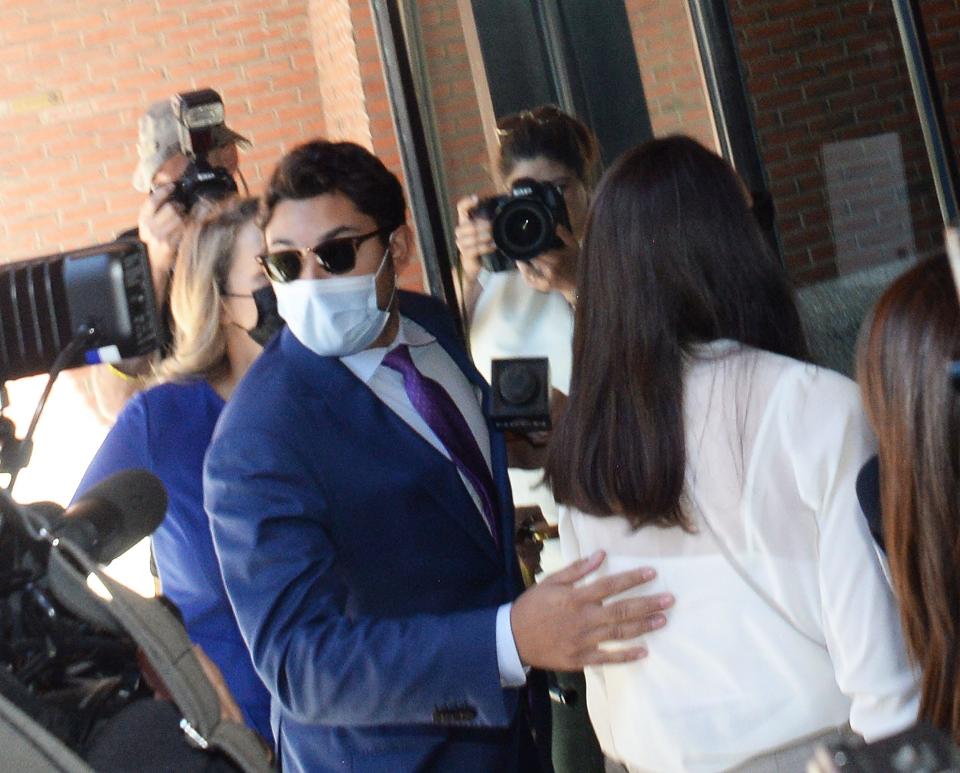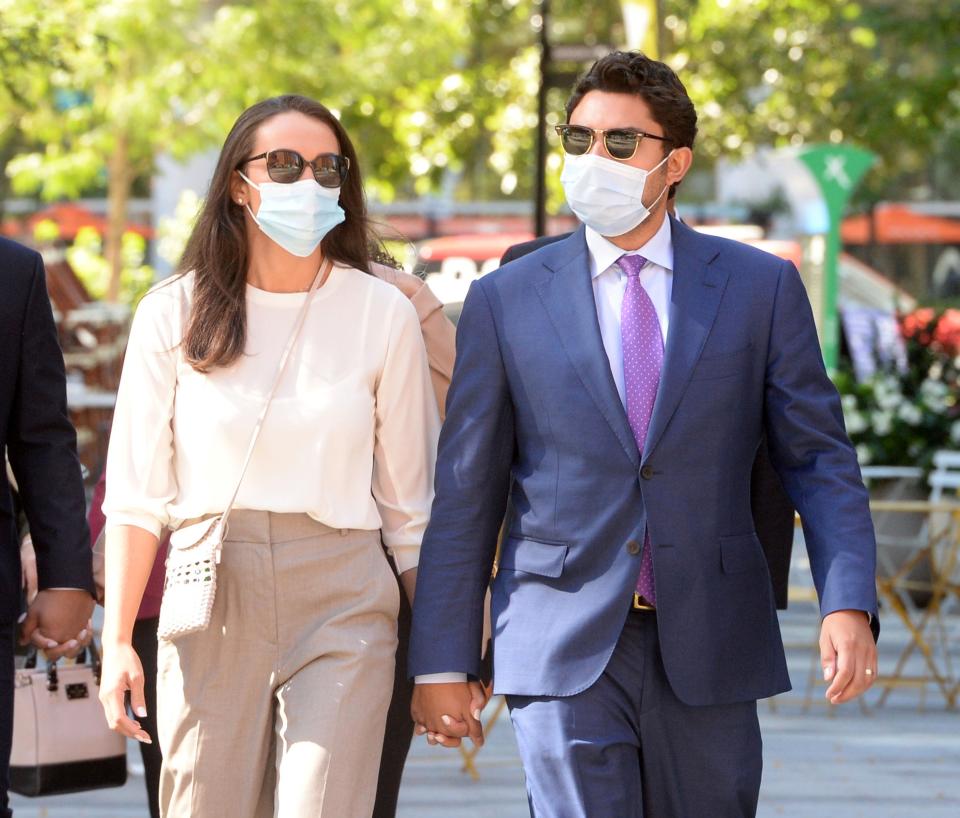Correia's lawyers tell appeals court his jury wasn't 'discerning.' Prosecutors disagree.
- Oops!Something went wrong.Please try again later.
BOSTON — Former Fall River mayor Jasiel Correia II had his virtual day in court on Thursday as three federal judges in the 1st Circuit Court of Appeals heard arguments on why the now-incarcerated ex-politician should have his convictions overturned or receive a new trial.
Oral arguments were heard before appellate judges Sandra L. Lynch, Bruce Selya and Jeffrey R. Howard in the 34-minute call-in, audio-only hearing. The hearing was live-streamed on the court's YouTube channel.
Correia is currently serving a six-year sentence for fraud and political corruption in a Berlin, New Hampshire, federal prison.
Somerset attorney and legal analyst Steven Sabra the appellate judges won’t make a decision on Correia’s appeal immediately.
“Generally, it takes about two to three months for a decision. First they will assign one of the judges to write a draft and then it will be circulated among the judges. If there is a dissenting opinion, that will be written and then they’ll write a full decision,” said Sabra.

Paper trail to prison: After his arrest, Jasiel Correia talked himself into deeper trouble
Focused oral arguments
Correia’s appellate attorney, Daniel Marx, didn’t stray from the pages of written arguments to have his case overturned or receive a new trial, but focused on narrower issues outlined in the appeals arguments with Assistant U.S. Attorney Mark Quinlivan.
Somerset attorney and legal analyst Steven Sabra said two argued issues struck him: the question of whether the federal jury that heard Correia’s case in 2021 was a “discerning” jury, and whether or not prosecutors prejudiced the jury when they showed a videotape during closing arguments of a debate video between Correia and former mayor Sam Sutter involving his claims with his app company SnoOwl.
Marx argued it was not a discerning verdict.
“Here the jury convicted Mr. Correia on 21 of 24 counts. Those included all of the wire fraud charges, all of the tax fraud charges and all of the charges related to marijuana vendors,” said Marx.
He noted that the jury found Correia not guilty of only three “marginal” charges for which he claimed there was “really no evidence at all.”
'We had the receipts': Prosecutor Zachary Hafer's one regret from the Jasiel Correia trial

In May 2021, the jury convicted Correia of 21 counts of defrauding investors in the SnoOwl app before he was elected mayor, tax fraud related to SnoOwl, and political corruption by extorting marijuana businessmen during his two terms as mayor from 2016 to 2020.
However, before sentencing in September 2021, federal District Court Judge Douglas Woodlock threw out 10 of the guilty verdicts related to the SnoOwl case, on the grounds that prosecutors had provided insufficient evidence to prove those charges.
Quinlivan rejected Marx’s argument and said that the three counts that the jury acquitted Correia on three of the corruption charges, and noted that Woodlock had deemed the jury “discerning and discriminating in this case.”
“This was a very careful jury; it was clear to me. They had four days to think this through,” said Quinlivan, referencing deliberations.

The basis of appeal: Were Jasiel Correia's claims of success just 'puffery'? Seven takeaways from his appeal
Marx alleges ‘improper’ closing argument by prosecutors
After a nearly four-week trial that ended in May 2021, Correia’s defense attorney and then-Assistant U.S. Attorney Zack Hafer squared off in closing arguments. Hafer replayed a video from a mayoral debate where Correia called SnoOwl a success with investors who “loved” the app company, even though investors were actually duped out of about $250,000.
Hafer told the jury that on camera Correia “had no problem looking voters in the eye” while making false claims that SnoOwl was making money for investors.
“That is someone who will say anything to get what he wants,” Hafer said during his closing.
Marx said Hafer referred to Correia sarcastically as “the candidate with honest answers.”
“It referred to him as the supposedly honest mayor who cared about this city. Perhaps most troubling, it referred to him repeatedly as the type of person who would lie, cheat and extort in the sense of having that type of criminal disposition,” said Marx.
Quinlivan countered that Correia’s statements were used fairly to dispute Correia's claims with the evidence presented in the fraud portion of the case.
“So, it was a fair argument in these circumstances to use the phrase ‘looking the voters in the eyes,’ because that’s essentially what the defendant had done,” said Quinlivan, adding that in the debate Correia literally looked at the audience as he spoke.
During his two-minute rebuttal, Marx argued that the reference to Correia lying to voters was a “classic propensity argument” that Correia was a liar in general.
“And when it's done in the context of the voters of Fall River, it's also an appeal for the jurors to act as the conscience of that community,” said Marx.
The judges kept comments brief throughout the hearing but suggested that it may have been appropriate given that Correia's trial involved public corruption.
Out for justice: The public is eager to punish Jasiel Correia. Law experts and a victim have another view.

The end of the road for Correia?
If Correia loses his appeal, this would likely be the end of a very long saga for the city's youngest elected mayor, which started with a 1½ years long federal investigation, two indictments and arrests while he was in office.
Correia's co-defendants — former city chief of staff and campaign manager Gen Andrade and associates Tony Costa, Hildegar Camara and David Hebert — entered guilty pleas for crimes ranging from extortion to lying to investigators, and are serving their sentences.
Except for Andrade, who was given a year of probation and a fine, the other three co-defendants are serving time in home confinement.
The marijuana vendors and other witnesses who had roles in extortion marijuana businesses, were given immunity in exchange for their cooperation.
Jo C. Goode may be reached at jgoode@heraldnews.com. Support local journalism and subscribe to The Herald News today!
This article originally appeared on The Herald News: Appeals court hears Jasiel Correia's arguments to overturn fraud case

